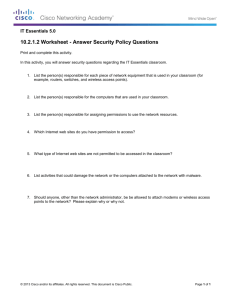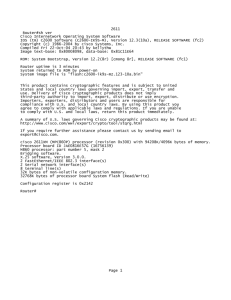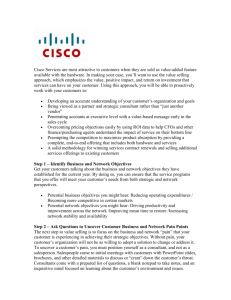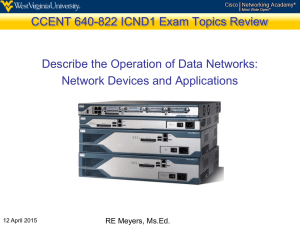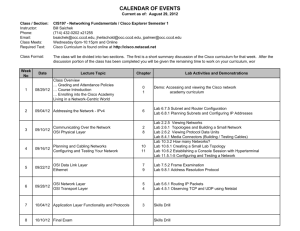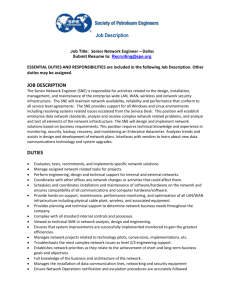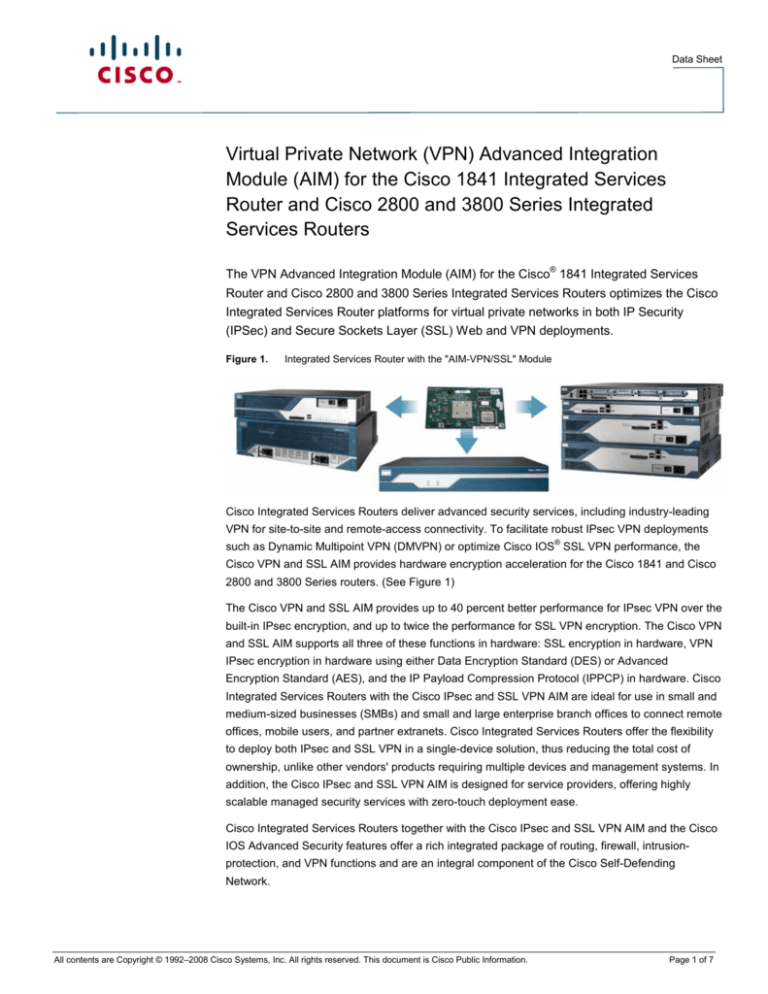
Data Sheet
Virtual Private Network (VPN) Advanced Integration
Module (AIM) for the Cisco 1841 Integrated Services
Router and Cisco 2800 and 3800 Series Integrated
Services Routers
®
The VPN Advanced Integration Module (AIM) for the Cisco 1841 Integrated Services
Router and Cisco 2800 and 3800 Series Integrated Services Routers optimizes the Cisco
Integrated Services Router platforms for virtual private networks in both IP Security
(IPSec) and Secure Sockets Layer (SSL) Web and VPN deployments.
Figure 1.
Integrated Services Router with the "AIM-VPN/SSL" Module
Cisco Integrated Services Routers deliver advanced security services, including industry-leading
VPN for site-to-site and remote-access connectivity. To facilitate robust IPsec VPN deployments
®
such as Dynamic Multipoint VPN (DMVPN) or optimize Cisco IOS SSL VPN performance, the
Cisco VPN and SSL AIM provides hardware encryption acceleration for the Cisco 1841 and Cisco
2800 and 3800 Series routers. (See Figure 1)
The Cisco VPN and SSL AIM provides up to 40 percent better performance for IPsec VPN over the
built-in IPsec encryption, and up to twice the performance for SSL VPN encryption. The Cisco VPN
and SSL AIM supports all three of these functions in hardware: SSL encryption in hardware, VPN
IPsec encryption in hardware using either Data Encryption Standard (DES) or Advanced
Encryption Standard (AES), and the IP Payload Compression Protocol (IPPCP) in hardware. Cisco
Integrated Services Routers with the Cisco IPsec and SSL VPN AIM are ideal for use in small and
medium-sized businesses (SMBs) and small and large enterprise branch offices to connect remote
offices, mobile users, and partner extranets. Cisco Integrated Services Routers offer the flexibility
to deploy both IPsec and SSL VPN in a single-device solution, thus reducing the total cost of
ownership, unlike other vendors' products requiring multiple devices and management systems. In
addition, the Cisco IPsec and SSL VPN AIM is designed for service providers, offering highly
scalable managed security services with zero-touch deployment ease.
Cisco Integrated Services Routers together with the Cisco IPsec and SSL VPN AIM and the Cisco
IOS Advanced Security features offer a rich integrated package of routing, firewall, intrusionprotection, and VPN functions and are an integral component of the Cisco Self-Defending
Network.
All contents are Copyright © 1992–2008 Cisco Systems, Inc. All rights reserved. This document is Cisco Public Information.
Page 1 of 7
Data Sheet
Table 1 lists the VPN module hardware and features supported by each platform. Table 2
describes the features supported by the Cisco IPsec and SSL VPN AIM. Table 3 describes the
benefits of the Cisco IPsec and SSL VPN AIM features.
Table 1.
Supported Modules and Features, by Platform
Module Part
Numbers
Cisco
1841
AIM-VPN/SSL-1
X
AIM-VPN/SSL-2
Cisco
2801,
2811,
2821,
2851
Cisco
3825
Cisco
3745
Cisco
3845
X
AIM-VPN/SSL-3
Table 2.
Cisco
3725
X
X
X
X
AES and
Triple Data
Encryption
Standard
(3DES)
IPPCP
WebVPN SSL
Encryption
IPv6
Cryptography
in Hardware
X
X
X
X
X
X
X
X
X
X
X
X
Supported Features of Cisco IPsec and SSL VPN AIM
Feature
Description
Physical
The Cisco IPsec and SSL VPN AIM fits in any open AIM slot in the Cisco Integrated Services Router.
Platform Support The Cisco IPsec and SSL VPN AIM supports the Cisco 1841 and the Cisco 2800, 3700, and 3800 Series.
Hardware
Prerequisites
An AIM slot for the Cisco 1841 and the Cisco 2800, 3700, and 3800 Series is required.
IPSec Encryption All modules support IPSec DES and 3DES; Authentication: Rivest, Shamir, and Adelman (RSA) and Diffie Hellman;
Supported
data integrity: Secure Hash Algorithm 1 (SHA-1) and Message Digest Algorithm 5 (MD5); and DES, 3DES, and
AES key sizes: AES128, AES192, and AES256.
Hardware SSL
Encryption
Supported
Only the Cisco IPsec and SSL VPN AIM in the Cisco 1841 and the Cisco 2800, 3700, and 3800 Series supports
SSL VPN encryption.
IPSec HardwareBased
Compression
The Cisco IPsec and SSL VPN AIM uses Layer 3 IPPCP compression.
Software
Prerequisites
The Cisco IPsec and SSL VPN AIM uses the Cisco IOS Software with the Advanced Security, Advanced IP,
or Advanced Enterprise feature set.
Number of
Encryption
Modules per
Router
The Cisco IPsec and SSL VPN AIM uses one encryption module per router.
Minimum Cisco
IOS Software
Version
Required
The Cisco IPsec and SSL VPN AIM requires Cisco IOS Software Version 12.4(9)T or higher.
Maximum
Number of IPSec
Encrypted
Tunnels
The Cisco IPsec and SSL VPN AIM supports up to 800 tunnels on the Cisco 1841, up to 1500 tunnels on the Cisco
2800 Series, and up to 2000 tunnels on the Cisco 3800 Series. The Maximum Tunnel Scalability test is done with
no data passing over the tunnels to only determine maximum number. For site-to-site design, Cisco recommends
you consult with your Cisco account team or a Cisco authorized reseller and also review the Cisco DMVPN Design
Guide at: http://www.cisco.com/application/pdf/en/us/guest/netsol/ns171/c649/ccmigration_09186a008075ea98.pdf
Maximum
Number of Cisco
IOS WebVPN
SSL VPN Users
with VPN and
SSL AIM
Only the Cisco IPsec and SSL VPN AIM supports Cisco IOS SSL VPN. On the Cisco 1841 and 2801, it supports 50
users; on the Cisco 2811 and 2821, it supports 100 users; on the Cisco 2851, it supports 150 users; on the Cisco
3725 and 3745, it supports 150 users; and on the Cisco 3825 and 3845, it supports 200 users. The Cisco IOS
WebVPN SSL VPN requires the purchase of a user license. (All supported platforms include a two-user demo
license at no additional cost.)
Standards
Supported
The Cisco IPsec and SSL VPN AIM supports the IPSec Internet Key Exchange (IKE): RFCs 2401 to 2410, 2411,
and 2451.
Table 3.
Features and Benefits of the Cisco IPsec and SSL VPN AIM
Feature
Benefit
High Overhead IPSec Processing
from the Main Processor
Reserves critical processing resources for other services such as routing, firewall, and voice
IPSec MIB
Allows Cisco IPSec configuration monitoring and can be integrated into a variety of VPN
management solutions
All contents are Copyright © 1992–2008 Cisco Systems, Inc. All rights reserved. This document is Cisco Public Information.
Page 2 of 7
Data Sheet
Feature
Benefit
Certificate Support to Facilitate
Automatic Authentication using
Digital Certificates
Scales encryption use for large networks requiring secure connections between multiple sites
Easy Integration of VPN Modules
into Existing Cisco 1841 and Cisco
2800, 3700, and 3800 Series Routers
Significantly reduces system costs, management complexity, and deployment effort compared
to multiple-device solutions
Confidentiality, Data Integrity, and
Data Origin Authentication through
IPSec
Facilitates secure use of public switched networks and the Internet for WANs
Cisco IOS SSL VPN
Allows businesses to securely and transparently extend their networks to any Internet-enabled
location using SSL VPN; the Cisco IOS SSL VPN supports clientless access to applications
such as HTML-based intranet content, e-mail, network file shares, and Citrix and to the Cisco
SSL VPN Client, enabling full network access remotely to virtually any application
Compression
Cisco IPsec and SSL VPN AIM provides hardware support for IPSec Layer 3 IPPCP and can
compress a packet before encryption. This allows for higher throughput for Wide Area
Networks (WAN) links
Cisco IPsec and SSL VPN AIM Performance
IPSec VPN
●
The Cisco 1841 Series Module (AIM-VPN/SSL-1) can provide hardware-based IPSec
encryption services of 25 and 95 Mbps in the Cisco 1841 (IPSec Internet mix [IMIX] and
1400-byte packets).1
●
The Cisco 2800 Series Module (AIM-VPN/SSL-2) can provide hardware-based IPSec
encryption services of 30 and 90 Mbps in the Cisco 2801, 35 and 100 Mbps in the Cisco
2811, 90 and 125 Mbps in the Cisco 2821, and 100 and 150 Mbps in the Cisco 2851
(IPSec IMIX and 1400-byte packets).1
●
The Cisco 3800 Series Module (AIM-VPN/SSL-3) can provide hardware-based IPSec
encryption services of 160 and 185 Mbps in the Cisco 3825 and 190 and 210 Mbps in the
Cisco 3845 (IPSec IMIX and 1400-byte packets).1
SSL VPN
●
The Cisco 1841 Series Module (AIM-VPN/SSL-1) c can provide hardware-based SSL VPN
encryption of 5 Mbps with a Maximum of 50 Users.
●
1
The Cisco 2800 Series Module (AIM-VPN/SSL-2) can provide hardware-based SSL VPN
encryption of 5Mbps with a Max of 50 users in the Cisco 2801, 5 Mbps with a Max of 75
users in the 2811, 10 Mbps with a Max of 100 users in the Cisco 2821, and 14 Mbps with a
Max of 150 users in the Cisco 2851 routers.2
●
The Cisco 3800 Series Module (AIM-VPN/SSL-3) can provide hardware-based SSL VPN
encryption of 20 Mbps with a Max of 175 Users in the Cisco 3825, and 26 Mbps with a Max
of 200 Users in the Cisco 3845 routers.
2
1
IPSec numbers are maximum values based on the Spirent IPSec IMIX definition and 1400-byte packet size.
Each test is performed with a single tunnel. Customers are urged to consult with the Cisco account team and
review all Cisco VPN solution design guides for greater detail on deployment options and scaling. Cisco
recommends IPsec user to also review the Cisco Solution Design Guides for more specific information on
scaling
http://www.cisco.com/application/pdf/en/us/guest/netsol/ns171/c649/ccmigration_09186a008075ea98.pdf and
http://www.cisco.com/en/US/customer/netsol/ns656/networking_solutions_design_guidances_list.html.
2
Customers are urged to consult the Cisco account team and review all Cisco Web VPN solution design
guides for greater detail on deployment options and scaling. The IOS SSLVPN performance will vary based on
which client is setup. SSLVPN client users will have higher overall performance than the SSLVPN clientless
setup, which will have slightly lower performance.
All contents are Copyright © 1992–2008 Cisco Systems, Inc. All rights reserved. This document is Cisco Public Information.
Page 3 of 7
Data Sheet
Features
SSL VPN
●
The Cisco IPsec and SSL VPN AIM offloads the SSL encryption processing, allowing
improved SSL VPN performance.
●
The Cisco IOS SSLVPN is the first router-based solution that offers SSL VPN remoteaccess connectivity integrated with security and industry-leading routing features on a
converged data, voice, and wireless platform.
●
SSL VPN is compelling because the security is transparent to the end user and easy for IT
personnel to administer. Using only a Web browser, companies can extend their secure
enterprise networks to any Internet-enabled location, including home computers, Internet
kiosks, and wireless hotspots, thereby facilitating higher employee productivity and
protecting corporate data while providing transient partner and consultant network access.
●
Cisco IOS SSL VPN supports both clientless and full-network-access SSL VPN capabilities.
For further information about Cisco IOS SSL VPN, refer to http://www.cisco.com/go/iossslvpn.
IPSEC VPN
®
Cisco Systems fully supports the entire set of RFCs that describe IPSec and related protocols:
RFCs 2401 to 2410. In particular, Cisco supports the following features:
●
DES, 3DES, and AES-the National Institute of Standards and Technology (NIST) created
AES as a Federal Information Processing Standard (FIPS) publication to replace DES,
IPSec and IKE. AES has a variable key length; the algorithm can specify a 128-bit key
(default), a 192-bit key, or a 256-bit key. For details about AES, refer to
http://csrc.nist.gov/encryption/aes/.
●
IPSec-this protocol uses encryption technology to provide data confidentiality, integrity, and
authenticity between participating peers in a private network. Cisco provides full
Encapsulating Security Payload (ESP) and authentication header support.
●
IKE-Using the Internet Security Association Key Management Protocol (ISAKMP) or
Oakley, IKE provides security association management. IKE authenticates each peer in an
IPSec transaction, negotiates security policy, and handles the exchange of session keys.
●
Certificate management-Cisco fully supports the X509.V3 certificate system for device
authentication and the Simple Certificate Enrollment Protocol (SCEP), a protocol for
communicating with certificate authorities. Several vendors, including Verisign, Entrust
Technologies, and Microsoft, support Cisco SCEP, and their products can operate with
Cisco devices.
●
RSA signatures and Diffie-Hellman-RSA and Diffie-Hellman are used every time an IPSec
tunnel is established to authenticate the IKE security association. Diffie-Hellman is used to
derive the shared secret encryption key for the protection of data across the IKE security
association, including the negotiation of the IPSec policy to be used.
●
Enhanced security-Hardware-based cryptography offers several security advantages over
software-based solutions, including enhanced protection of keys.
For further information about Cisco IOS IPSec VPN, refer to
http://www.cisco.com/en/US/customer/products/ps6635/products_ios_protocol_group_home.html.
All contents are Copyright © 1992–2008 Cisco Systems, Inc. All rights reserved. This document is Cisco Public Information.
Page 4 of 7
Data Sheet
Certifications
Cisco is committed to maintaining an active product certification and evaluation program for
customers worldwide. Cisco recognizes that certifications and evaluations are important to its
customers, and the company continues to be a leader in providing certified and evaluated products
to the marketplace. Cisco also will continue to work with international security standards bodies to
help shape the future of certified and evaluated products and will work to accelerate certification
and evaluation processes. Certification and evaluation are considered at the earliest part of the
company's product development cycle, and Cisco will continue to position its security products to
ensure that customers have a variety of certified and evaluated products to meet their needs.
Cisco pursues ICSA, Common Criteria (EAL), and FIPS 140-2 Certification see (Figure 2).
Figure 2.
FIPS
The Cisco VPN modules have been designed to meet FIPS 140-2 Level 2 security. Currently, only
specific models have FIPS 140-2 certification. See product certifications by certification type for
the current status of Cisco products certified for FIPS:
●
http://www.cisco.com/en/US/customer/netsol/ns340/ns394/ns171/networking_solutions_au
dience_business_benefit0900aecd8009a16f.html
●
http://csrc.nist.gov/cryptval/
ICSA IPSec
The Internet Computer Security Association (ICSA) is a commercial security certification body that
offers ICSA IPSec and ICSA Firewall certification for various types of security products. Cisco
participates in ICSA's IPSec and Firewall certification programs. See product certifications by
certification type for the current status of Cisco products certified for ICSA
http://www.cisco.com/en/US/customer/netsol/ns340/ns394/ns171/networking_solutions_audience_
business_benefit0900aecd8009a16f.html.
All contents are Copyright © 1992–2008 Cisco Systems, Inc. All rights reserved. This document is Cisco Public Information.
Page 5 of 7
Data Sheet
Common Criteria
Common Criteria is an international standard for evaluating IT security. It was developed by a
consortium of countries to replace numerous existing country-specific security assessment
processes and was intended to establish a single standard for international use. Currently, 14
countries officially recognize the Common Criteria. Several versions of the Cisco ISR Routers are
now being evaluated under the Information Technology Security Evaluation Criteria (ITSEC) and
the Common Criteria. See product certifications by certification type for the current status of Cisco
products certified for Common Criteria:
●
http://www.cisco.com/en/US/customer/netsol/ns340/ns394/ns171/networking_solutions_au
dience_business_benefit0900aecd8009a16f.html
●
http://www.commoncriteriaportal.org/
Cisco 1841 and Cisco 2800, 3700, and 3800 Series VPN Module Software
With a VPN module installed, the router will run with any feature set for the Cisco IOS Software,
but the module is used only with IPSec or SSL VPN feature sets.
Export Regulations for the VPN Module
DES, 3DES, and AES software for the VPN module is controlled by U.S. export regulations for
encryption products. The module itself is not controlled. U.S. regulations require the recording of
names and addresses of recipients of DES and 3DES software. The Cisco ordering process for
DES and 3DES software enforces these requirements.
Specifications
Table 4.
Specifications
Feature
Specification
Part Number
and
Description
● AIM-VPN/SSL-1: Cisco 1841 DES, 3DES, AES, SSL, and Layer 3 (IPPCP) Compression VPN Encryption
● AIM-VPN/SSL-2: Cisco 2800 Series DES, 3DES, AES, SSL, and Layer 3 (IPPCP) Compression VPN Encryption
IPSec RFC
Support
● IPSec (RFCs 2401 to 2410)
● IPSec ESP using DES and 3DES (RFC 2406)
● IPSec authentication header using MD5 or SHA (RFCs 2403 to 2404)
● AIM-VPN/SSL-3: Cisco 3800 Series DES, 3DES, AES, SSL, and Layer 3 (IPPCP) Compression VPN Encryption
● IKE (RFCs 2407 to 2409)
● GDOI (RFC 3547 – Group Domain of Interpretation)
Environmental
● Operating temperature: 32 to 104°F (0 to 40°C)
● Nonoperating temperature: -4 to 149°F (-20 to 65° C )
● Relative humidity: 10 to 85% noncondensing operating; 5 to 95% noncondensing, nonoperating safety
Dimensions and Weight
Table 5 lists dimensions and weight by platform.
Table 5.
Dimensions and Weight
Module
AIM-VPN/SLL-1
AIM-VPN/SSL-2
AIM-VPN/SSL-3
Width
5.25 in. (13.3 cm)
5.25 in. (13.3 cm)
5.25 in. (13.3 cm)
Height
0.95 in. (2.41 cm)
0.95 in. (2.41 cm)
0.95 in. (2.41 cm)
Depth
3.25 in. (8.26 cm)
3.25 in. (8.26 cm)
3.25 in. (8.26 cm)
Weight
0.60 lb (0.27 kg)
0.60 lb (0.27 kg)
0.60 lb (0.27 kg)
All contents are Copyright © 1992–2008 Cisco Systems, Inc. All rights reserved. This document is Cisco Public Information.
Page 6 of 7
Data Sheet
Regulatory Compliance, Safety, EMC, Telecom, and Network Homologation
When installed in a Cisco 1800 (modular), 2800, 3700, or 3800 Series router, the VPN module
does not change the standards (Regulatory Compliance, Safety, EMC, Telecom, or Network
Homologation) of the router itself. Refer to data sheets for the Cisco 1800 (modular), 2800, 3700,
and 3800 Series routers.
To Download the Software
Visit the Cisco Software Center to download the Cisco IOS Software.
Service and Support
Cisco offers a wide range of services programs to accelerate customer success. These innovative
services programs are delivered through a unique combination of people, processes, tools, and
partners, resulting in high levels of customer satisfaction. Cisco services help you protect your
network investment, optimize network operations, and prepare your network for applications to
extend network intelligence and the power of your business. For more information about Cisco
services, refer to Cisco Technical Support Services or Cisco Advanced Services.
For More Information
For more information about the Cisco VPN modules, visit http://www.cisco.com or contact your
local Cisco account representative.
Printed in USA
All contents are Copyright © 1992–2008 Cisco Systems, Inc. All rights reserved. This document is Cisco Public Information.
C78-353932-04 02/08
Page 7 of 7


